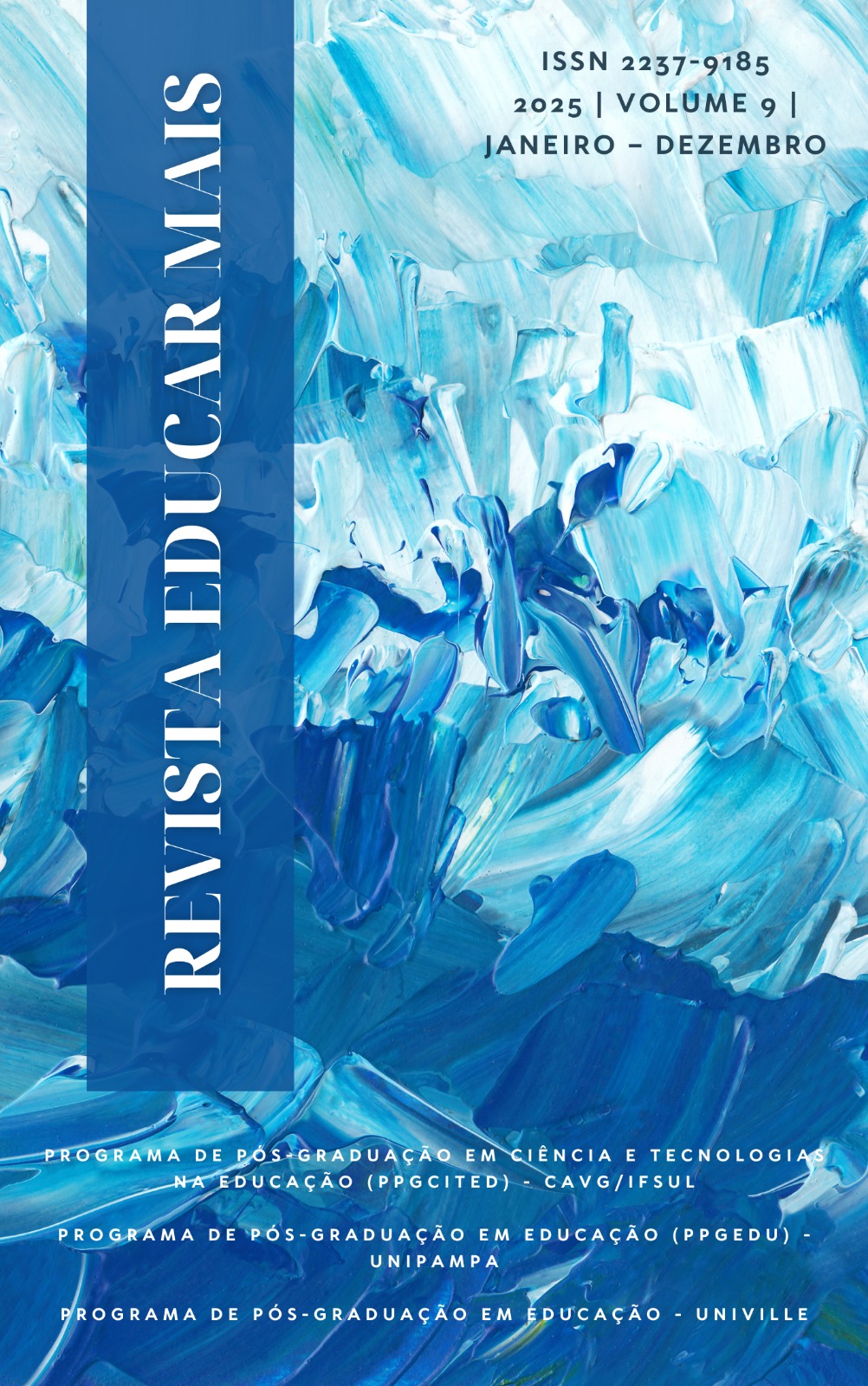From Contrast to Dialogue: PROEJA and TADS Facing Disinformation in Cyberculture
DOI:
https://doi.org/10.15536/reducarmais.9.2025.4236Keywords:
Professional and Technological Education, Cyberculture, Disinformation, Critical Thinking, PROEJAAbstract
Cyberculture has transformed the modes of production, access, and circulation of information, expanding opportunities for interaction and learning, but also favoring the spread of disinformation. In this context, Professional and Technological Education (PTE) plays a strategic role by articulating work, science, technology, and culture, aiming to educate critical and socially engaged subjects. This article analyzes, from the PTE perspective, the perceptions of students from the PROEJA program (Technical Course in Computer Maintenance and Support) and from the undergraduate Technology in Systems Analysis and Development (TADS) course, both at IFG – Campus Formosa, regarding disinformation in cyberculture, highlighting contrasts and pedagogical possibilities. The qualitative research used questionnaires and discussion groups, analyzed through content analysis. Results showed that PROEJA students face greater difficulties due to restricted access to ICTs and lack of systematic checking practices, while TADS students demonstrated greater technical familiarity but without consolidated critical routines. It is concluded that the approximation between PROEJA and TADS can generate mutual gains, reaffirming the social role of PTE and the mission of Federal Institutes to promote inclusion, emancipation, and critical awareness.
Downloads
References
APPIO, Célia Regina; EWALD, Izilene Conceição Amaro; SILVA, Valdelino de Carvalho. A formação integral na Educação Profissional e Tecnológica: alguns apontamentos. Metodologias e Aprendizado, v. 1, n. 1, p. 11-16, 2020.
ARRELIAS, Flávia Carolina de Rezende; MELO, Daniel de Souza; CAVALCANTE, Edcleide Cândida de Araújo. Tecnologias digitais e aprendizagem colaborativa: práticas inovadoras na Educação Profissional e Tecnológica. Revista Brasileira da Educação Profissional e Tecnológica, v. 1, n. 22, p. 1-15, 2022.
BARDIN, Laurence. Análise de conteúdo. Lisboa: Edições 70, 2011.
BRASIL. Lei nº 11.892, de 29 de dezembro de 2008. Institui a Rede Federal de Educação Profissional, Científica e Tecnológica, cria os Institutos Federais de Educação, Ciência e Tecnologia, e dá outras providências. Brasília: Ministério da Educação, 2008. Disponível em: http://www.planalto.gov.br/ccivil_03/_Ato2007-2010/2008/Lei/L11892.htm. Acesso em: 14 ago. 2025.
FREIRE, Paulo. Pedagogia da autonomia: saberes necessários à prática educativa. 34. ed. São Paulo: Paz e Terra, 1996.
FRIGOTTO, Gaudêncio; CIAVATTA, Maria; RAMOS, Marise. A politecnia no ensino médio: concepção e realidade. São Paulo: Cortez, 2005.
LÉVY, Pierre. Cibercultura. 3. ed. São Paulo: Editora 34, 2011.
OLIVEIRA, Maria Lívia Pachêco de. Cultura da convergência informacional e fake news: uma análise crítica. 2020. Tese (Doutorado em Ciência da Informação) – Escola de Ciência da Informação, Universidade Federal de Minas Gerais, Belo Horizonte, 2020.
PACHECO, Eliezer. Fundamentos político-pedagógicos dos Institutos Federais: diretrizes para uma educação profissional e tecnológica transformadora. Natal: IFRN, 2015.
SANTOS JÚNIOR, Ronaldo Ferreira dos. Competência crítica em informação: fundamentos teórico-metodológicos e perspectivas de aplicação. 2020. Tese (Doutorado em Ciência da Informação) – Faculdade de Ciência da Informação, Universidade de Brasília, Brasília, 2020.
UNESCO. Journalism, “Fake News” and Disinformation: handbook for journalism education and training. Paris: UNESCO, 2020. Disponível em: https://unesdoc.unesco.org/ark:/48223/pf0000265552. Acesso em: 14 ago. 2025.
WARDLE, Claire; DERAKHSHAN, Hossein. Information disorder: Toward an interdisciplinary framework for research and policy making. Strasbourg: Council of Europe, 2017. Disponível em: https://edoc.coe.int/en/media/7495-information-disorder-toward-an-interdisciplinary-framework-for-research-and-policy-making.html. Acesso em: 14 ago. 2025.
Downloads
Published
How to Cite
Issue
Section
License
Copyright (c) 2025 Marcos Gomes Araújo, Ricardo Faustino Teles

This work is licensed under a Creative Commons Attribution-NonCommercial 4.0 International License.
DECLARATION OF RESPONSIBILITY: I hereby certify that I partially or fully participated in the conception of the work, that I did not hide any links or financial agreements between the authors and companies that may be interested in this article publication. I certify that the text is original and that the work, partially or fully, or any other work with a substantially similar content written by me, was not sent to any other journal and it will not be send while my submission is being considered by Revista Educar Mais, whether in printed or electronic format.
The author responsible for the submission represents all the authors of the manuscript and, when sending the article to the journal, guarantees s/he has obtained the permission to do so, as well as s/he guarantees the article does not infringe upon anyone’s copyright nor violate any proprietary rights. The journal is not responsible for the opinions expressed.
Revista Educar Mais is Open Access, does not charge any fees, whether for submission or article processing. The journal adopts Budapest Open Access Initiative (BOAI)’s definition, i.e., any users are permitted to read, download, copy, distribute, print, search and link to the full texts of these articles.
All the articles are published under the Creative Commons Atribuição-NãoComercial 4.0 Internacional license. The authors keep the copyright of their production. That way, they must be contacted directly if there is any interest in commercial use of their work.
















